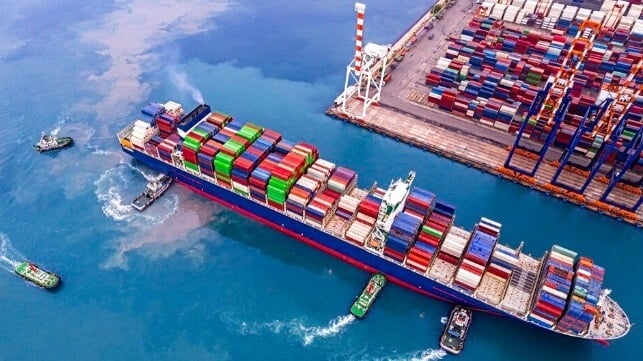AAPA-Backed Bill Would Create Tax Credit for U.S. Builders of STS Cranes

The American Association of Port Authorities (AAPA) congratulates Representatives Mike Ezell (R-MS4) and Nicole Malliotakis (R-NY11) on introducing the Port Cranes Tax Credit Act of 2025 (H.R.?4589) along with two original cosponsors: Representatives Randy Weber (R-TX14) and Jen Kiggans (R-VA2).
The bill will boost domestic manufacturing, bolster supply chain resiliency, and support national security by beginning to bring port crane manufacturing back to America. It does so by establishing a 25% investment tax credit for qualified U.S. facilities that manufacture or repair ship-to-shore (STS) and mobile harbor port cranes, along with a production credit of 40%, rising to 60% if at least 90% of crane components are American made. AAPA looks forward towards working with Congress to see this bill passed into law, which would bring crane manufacturing back to America much faster than tariffs on foreign equipment paid by American households and businesses.
“Without safe, reliable and affordable cranes, America’s ports would not be able to move the goods that sustain our economy and support the daily lives of American consumers,” said Cary S. Davis, AAPA President and CEO. “Instead of levying unfair taxes on port development, the Port Cranes Tax Credit Act is a tangible first step on the supply side towards incentivizing the reshoring of key cargo-handling equipment in the coming years since there are currently no domestic STS crane manufacturers. We thank lead sponsors Representatives Ezell and Malliotakis, alongside original cosponsors, Representatives Weber and Kiggans, for recognizing the need for supply side incentives - not punishments on the demand side through taxes - and encourage others concerned about the future of the port industry and our nation’s supply chains to support this bill and quickly get it to President Trump’s desk.”
“Our ports are essential to our economy—and our national security,” Ezell said. “They serve as the gateways for trade, driving billions of dollars in commerce and supporting millions of jobs across the country. But more than that, they are critical infrastructure, and their vulnerability can pose real risks to our national safety. From cybersecurity threats to supply chain disruptions, foreign control over critical components—like ship-to-shore cranes—creates unacceptable exposure to espionage, sabotage, and logistical choke points. The Port Crane Tax Credit of 2025 is about putting American workers and American safety first. It will incentivize the production and deployment of domestically manufactured cranes, reduce our dependence on adversarial nations, and stimulate investment in American manufacturing and innovation. This isn’t just an economic policy—it’s a national security imperative. I’m proud to introduce this legislation to strengthen our ports, empower our workforce, and reinforce the foundation of American resilience.”
“Modern cargo handling equipment is a major capital expense for Port operations. As the largest inland public port and logistic hub in Upstate New York, the Port of Albany couldn’t function without key equipment – from our mobile harbor cranes to our front loaders and forklifts. We have to keep the supply chain moving,” said Richard J. Hendrick Sr., Port of Albany CEO and AAPA Board of Directors Vice Chair. “The Port’s been operating for almost a century, and the numbers don’t lie – our overall economic impact on New York State is annually more than $813 million with approximately 4,500 related jobs. Vessel calls have increased 41% during the past year due to Heavy Lift work and breakbulk cargo. I’m proud of those numbers, and the people who make those numbers possible, year after year, but they need the right equipment. We need to support onshoring manufacturing and good manufacturing jobs, and to make sure that our U.S. ports are equipped to continue to get the job done. I applaud Representatives Malliotakis and Ezell, and original cosponsors Representatives Weber and Kiggans, for taking decisive action to move the 2025 Port Cranes Tax Credit Act forward.”
“Strengthening and securing our nation's supply chain resiliency depends on U.S.-built and manufactured port cranes. This bill addresses urgent national security concerns and our nation’s ports greatly benefit from this proposed legislation to create tax incentives to support domestic production of port infrastructure equipment,” explained Paul Anderson, Port Tampa Bay President and CEO.
"Congressman Mike Ezell’s leadership on the Port Crane Tax Credit Act of 2025 is exactly the kind of forward-thinking support Gulf Coast ports like ours need to stay competitive and meet the demands of a modern, American-made supply chain,” stated Bo Ethridge, Port Pascagoula Port Director. “Port Pascagoula plays a critical role in the regional economy, and as manufacturing continues to return to U.S. shores, our port is experiencing increased demand and new growth opportunities. Yet we remain the only major Gulf Coast port without cargo cranes, which is an infrastructure gap that limits our ability to diversify commodities. This legislation is a vital step toward closing that gap. With federal support, including incentives like this tax credit, we can move forward with the acquisition of two mobile harbor cranes that will significantly enhance our operational capabilities and position us to serve a broader range of industries and cargo types. We’re proud to work alongside Congressman Ezell to strengthen America’s ports and power the future of domestic manufacturing."
AAPA urges swift consideration of the Port Cranes Tax Credit Act by the House Committee on Ways and Means and encourages Senators to introduce companion legislation in their chamber. By supporting domestic production of port crane infrastructure, Congress can help ensure the competitiveness, security, and resiliency of America’s ports.
The products and services herein described in this press release are not endorsed by The Maritime Executive.
